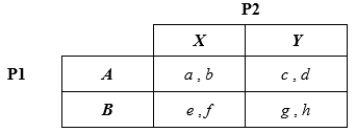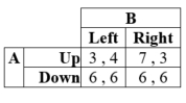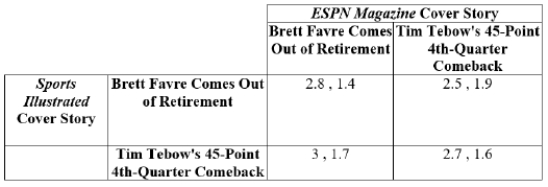Exam 12: Game Theory
Exam 1: Adventures in Microeconomics20 Questions
Exam 2: Supply and Demand148 Questions
Exam 3: Using Supply and Demand to Analyze Markets146 Questions
Exam 4: Consumer Behavior130 Questions
Exam 5: Individual and Market Demand146 Questions
Exam 6: Producer Behavior142 Questions
Exam 7: Costs179 Questions
Exam 8: Supply in a Competitive Market148 Questions
Exam 9: Market Power and Monopoly162 Questions
Exam 10: Market Power and Pricing Strategies165 Questions
Exam 11: Imperfect Competition172 Questions
Exam 12: Game Theory170 Questions
Exam 13: Factor Markets94 Questions
Exam 14: Investment, Time, and Insurance117 Questions
Exam 15: General Equilibrium97 Questions
Exam 16: Asymmetric Information106 Questions
Exam 17: Externalities and Public Goods114 Questions
Exam 18: Behavioral and Experimental Economics112 Questions
Select questions type
(Table: Firms A and B XII)  a. What is the Nash equilibrium if the game is played once with simultaneous moves?
b. What is the Nash equilibrium if the game is played sequentially?
a. What is the Nash equilibrium if the game is played once with simultaneous moves?
b. What is the Nash equilibrium if the game is played sequentially?
(Essay)
4.9/5  (34)
(34)
(Table: Firms 1 and 2 II) The payoffs are profits in millions of dollars.  If Firm 1 follows a maximin strategy, the outcome of this game is:
If Firm 1 follows a maximin strategy, the outcome of this game is:
(Multiple Choice)
4.9/5  (41)
(41)
(Table: Lemonade) Andrei and Sonya operate lemonade stands in the same neighborhood.  Payoffs are in quarters . The kids have formed an agreement to restrict output. They are playing an infinitely repeated game in which output decisions must be made every period and both of them are using tit-for-tat trigger strategies. If the discount rate is d = 0.4, then the players ____.
Payoffs are in quarters . The kids have formed an agreement to restrict output. They are playing an infinitely repeated game in which output decisions must be made every period and both of them are using tit-for-tat trigger strategies. If the discount rate is d = 0.4, then the players ____.
(Multiple Choice)
4.8/5  (46)
(46)
(Table: History Channel and Animal Planet I) Payoffs represent profits in thousands of dollars.  In this game, the Nash equilibria are:
In this game, the Nash equilibria are:
(Multiple Choice)
4.8/5  (42)
(42)
The table contains letters that represent payoff values. If the strategy combination (B , Y) is a Nash equilibrium, then prove that the strategy combination (A , X) must also be a Nash equilibrium assuming there are no dominant strategies. Assume that no two letters will take on the same value. 
(Essay)
4.8/5  (23)
(23)
(Table: Firms 1 and 2 III) Payoffs represent profits in millions of dollars.  Firm 1's dominant strategy is ____.
Firm 1's dominant strategy is ____.
(Multiple Choice)
4.9/5  (44)
(44)
Suppose two players use strategies that produce these payoffs:  a. What are the pure-strategy Nash equilibria if any?
b. What is the mixed-strategy Nash equilibrium?
a. What are the pure-strategy Nash equilibria if any?
b. What is the mixed-strategy Nash equilibrium?
(Essay)
4.8/5  (29)
(29)
Consider the following game.  The choices of ____ represent a Nash Equilibrium in this game.
The choices of ____ represent a Nash Equilibrium in this game.
(Multiple Choice)
4.9/5  (34)
(34)
Suppose that Galina and Vlada are playing a finitely repeated flag game. The game starts with seven flags in the ground, and the players take turns removing the flags. A player must remove either one, two, or three flags per turn. The player who takes the last flag out of the ground, whether it is by itself or in a group, wins the game. Assume that Galina decides first on how many flags to remove. How many flags should Galina remove on her first turn to guarantee that she will win the game? Use backward induction.
(Multiple Choice)
4.8/5  (29)
(29)
Two boxers, Brutus and Floyd, are training to fight each other. Each boxer is considering whether to take steroids to improve his chance of winning the fight. Assume that the boxing association does not have a policy against steroid use. If both boxers take steroids, neither has an advantage and the payoffs (net of health costs) are $3 million per boxer. If both boxers don't take steroids, the payoffs are $4 million per boxer. If one boxer takes steroids and the other doesn't, the boxer taking the steroids receives a payoff of $6 million (net of health costs) and the other boxer receives a $1 million payoff.
a. Represent the preceding information in a normal-form game.
b. What is the Nash equilibrium?
c. Would the boxers be better off if the boxing association banned steroids and tested each boxer for steroids prior to a fight?
(Essay)
4.9/5  (27)
(27)
(Table: Firms A and B I) The payoffs represent profits measured in thousands of dollars.  In this infinitely repeated game, Firm A and Firm B are both using grim trigger strategies; they agree to charge a high price in period one. If Firm A has a change of heart and decides not to charge a high price in period one, what is Firm A's expected payoff from cheating? Assume that d = 0.9.
In this infinitely repeated game, Firm A and Firm B are both using grim trigger strategies; they agree to charge a high price in period one. If Firm A has a change of heart and decides not to charge a high price in period one, what is Firm A's expected payoff from cheating? Assume that d = 0.9.
(Multiple Choice)
4.9/5  (29)
(29)
(Table: Players A and B VII)  In Table 1, ____ is a Nash Equilibrium.
In Table 1, ____ is a Nash Equilibrium.
(Multiple Choice)
4.8/5  (27)
(27)
Suppose that you are playing an infinitely repeated game. You and your opponent agree to restrict output each period to maximize discounted profit. For each period, you and your opponent have to touch a button on a computer screen that selects the level of output, namely, restricted or unrestricted output. Once the button is touched, the output is locked in for the period and cannot be changed. If your opponent has a shaky hand, would you rather use a grim trigger strategy or a tit-for-tat strategy?
(Essay)
4.8/5  (28)
(28)
Which of the following games is solvable by backward induction?
I. a 3-period simultaneous game
II. an infinitely repeated simultaneous game
III. a 1-period simultaneous game
IV. a sequential game
(Multiple Choice)
4.8/5  (31)
(31)
According to Goolsbee and Syverson, how did incumbent airlines respond to the entry of Southwest Airlines?
(Multiple Choice)
4.8/5  (32)
(32)
At one time, tobacco companies vigorously fought lawsuits by their current and former customers, even though the cost of defending the lawsuits exceeded the amount of money demanded by the smokers. What type of strategic behavior were tobacco companies using?
(Multiple Choice)
4.7/5  (31)
(31)
(Table: Sports Illustrated and ESPN Magazines I) Payoffs represent profits in millions of dollars.  What is ESPN's dominant strategy?
What is ESPN's dominant strategy?
(Multiple Choice)
4.8/5  (41)
(41)
(Table: Jack and Jill I)  If Jack chooses to climb the hill and Jill brings the pail, Jill's payoff is ____.
If Jack chooses to climb the hill and Jill brings the pail, Jill's payoff is ____.
(Multiple Choice)
4.8/5  (31)
(31)
(Table: Jack and Jill I)  If Jack chooses to not climb the hill and Jill brings the pail, Jack's payoff is ____.
If Jack chooses to not climb the hill and Jill brings the pail, Jack's payoff is ____.
(Multiple Choice)
5.0/5  (42)
(42)
Showing 41 - 60 of 170
Filters
- Essay(0)
- Multiple Choice(0)
- Short Answer(0)
- True False(0)
- Matching(0)